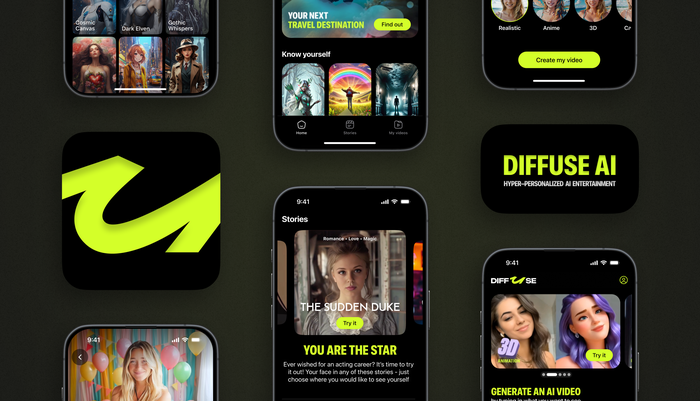How AI helped build a 100-million-user app behemoth

Michael Endler
AI Editor, Google Cloud
App developer Bending Spoons has the perfect recipe for building products consumers love powered by data and AI, the cloud, and a huge serving of imagination.
If you can dare to dream it, there’s an app for it. And if it doesn’t exist yet, Bending Spoons might just be the company to build it.
Since its launch in 2013, Bending Spoons has never let reality limit possibility. Known primarily for its mobile apps, the Milan-based company has made a name for itself with app marketplace hits like the popular video editor Splice and AI photo enhancer Remini.
To say competition in the app market is high would be an understatement. App marketplaces contain millions of similar apps competing for downloads, with thousands of new releases being added every month. But Bending Spoons has managed to stand out in a crowded space by betting big on data and AI technologies, an unwavering focus on customer experience, and a mentality that possibility lies in the eye of the beholder.
Specifically, whereas many startups begin with an app and then figure out how to scale into reliable platform capabilities, Bending Spoons thought about platforms from the start, helping them to create a range of robust, powerful apps. And whereas many companies build machine learning (ML) into their apps by leveraging third-party models, Bending Spoons has leveraged its platform capabilities to create sophisticated AI technologies in-house.
“Bending Spoons is a fairly unusual company in that most companies are built to bring to the market a very specific product,” said Luca Ferrari, co-founder and CEO of Bending Spoons. “We took pretty much the opposite direction of building a platform that’s optimized for operating, developing, and scaling a variety of digital products. We focus on building the machine that builds the product.”
With around half a billion app downloads and 100 million monthly active users, it’s clear the company has found a successful formula for building apps people love.
Building the engine to power it all
A crucial piece of Bending Spoon’s winning strategy is a heavy focus on data-driven insights and a willingness to explore new and emerging technologies like AI to create value. While the recent explosion of interest around the potential of generative AI technologies has companies of all shapes and sizes racing to amp up their AI strategies, Bending Spoons has been building its competencies for years.
“We have a long history with artificial intelligence, machine learning, and data science,” said Lorenzo Migliorino, MLOps engineer at Bending Spoons. “We are really passionate and enthusiastic about knowledge.”

For instance, the team built its predictive analytics engine, Minerva, back in 2019 leveraging early ML techniques and its existing implementation of Google Cloud services to help accurately predict the lifetime value of its users. Today, the ML model at Minerva’s core continues to produce predictions that enable Bending Spoons to automate, iterate, and optimize faster.
Minerva is just one example of many where AI technologies, powered by cloud computing services, are helping drive decision-making and innovations that keep Bending Spoons ahead of the curve. The company boasts an impressive portfolio of more than 50 state-of-the-art technologies that help support its data-driven approach while also powering some of its most exciting product features, such as Remini’s signature AI enhancements that transforms blurry photos into high-definition images with one swipe.
To accomplish this, Migliorino said the team made three critical investments. First, establishing a team of top-notch data science and engineering talent. Next, building a cloud-based AI platform to empower its researchers with the cutting-edge technologies; these included virtual machines running on powerful graphical processing units (GPUs) for high-performance processing, hyperparameter tuning capabilities for optimizing predictive models, and cloud-based storage, data warehousing, and security. Finally, they created an AI infrastructure that could support low latency predictions and handle unstructured data, such as images, audio, and videos.


The team at Bending Spoons has always prioritized supplementing its own AI models to simply relying on those created by others in order to deliver the best user engagement.
“Basically, we gave our researchers all the tools,” Migliorino said. “Our apps, such as Remini, are not simply using models created by someone else in the world. Our models are actually state-of-the-art, and we have our researchers constantly improving them.”
This appetite for experimentation has played a vital role in Bending Spoon’s success.
No mission is impossible with the right mindset
Bending Spoons is constantly on the hunt for ways to create services that bring real value to people, whether that requires building new products or improving existing ones. The company is always looking to enhance the way it operates and make its platform faster, more powerful, and more flexible.
For example, when Bending Spoons discovered that its existing way of provisioning and configuring infrastructure wasn’t scaling well for the data science team and taking up valuable time, the team didn’t hesitate to make a change. It built its own text-based user interface to enable its data science team to run and manage workloads on Google Cloud.
“In this way, every researcher can now create as many machines in it with as many GPUs as they want in a matter of minutes,” Migliorino said.
He also noted that the team always carefully considers what combination of techniques and technologies best accomplish the intended purpose of each of its apps, iterating and experimenting to reveal new ways to boost performance and improve experiences.
For example, it improved Remini’s models through knowledge distillation, a process that allows a larger, complex ML model to transfer its knowledge to a smaller one. Model distillation can help reduce the compute and memory required to serve a model while still achieving similar results. It also can significantly cut the amount of time customers have to wait when enhancing and editing their photos and videos.
“Honestly, it’s pretty marvelous because it works really well,” Migliorino said. “You have a model which is one third or one fourth as large as the original model, but there is no perceivable loss of quality.”
This continuous engine of idea, experimentation, and validation yields undeniable results. The team built a lightweight model for Splice that can be deployed directly to a mobile device, processing more than 64,000 frames per second. Rewriting its infrastructure orchestration layer and other monitoring improvements helped them scale to handle more than two million daily downloads when one of their apps went viral.
“In general, we are not really married to a specific technology or level of complexity,” Migliorino said. “We like to explore and not limit ourselves. We like to give freedom to our researchers and developers.”
Walking the right path to innovation
At the same time, exploring shouldn’t be mistaken for flying blind. Bending Spoons collects information from millions of in-app events to model and inform a wide range of decisions, from minor app updates to broader strategic pivots. With every new challenge, the team carefully evaluates the cost of finding an existing solution or building a new one, letting the data guide them.
When it comes to using AI, for instance, Bending Spoons treats it like any other technology in the toolbox that product, data science, and engineering teams can use to exceed customer expectations or achieve goals more efficiently and cost-effectively.
“Our view is that users and customers, generally speaking, couldn’t care less about AI,” Ferrari said. “What they care about is functionality, content, customer service, and the lowest price possible. Ideally, all of these at the same time.”
Although enormously powerful, in this context AI is just another tool to provide users and customers with what they want,” he added.
Users and customers, generally speaking, couldn’t care less about AI. What they care about is functionality, content, customer service, and the lowest price possible.
Of course, as technology enthusiasts, the team doesn’t discount innovation waves, particularly when they carry as much potential as AI and ML to help achieve company results and create products that sell. Currently, the company is investigating how large language models (LLMs) can be used to improve the experience of its custom keyboard, Fonts, and has plans to explore how these models can help make it easier to access and organize information, such as internal documentation.
Still, Ferrari’s advice to organizations looking to capitalize on emerging technologies is to have an open mind but keep the customer at the heart of the design and development process.
Bending Spoons rarely starts with AI directly when designing a product, preferring to focus on diagnosing potential pain points, spotting gaps in the market, and customer needs. From there, the team assesses how technologies, including AI, can provide more value to the customer while also considering opportunities for monetization and other ways to benefit the business.
These kinds of user-centric approaches offer a great model for companies across all industries as they dive into the AI landscape, building the kind of expertise that’s been a cultural foundation at Bending Spoons for years.



